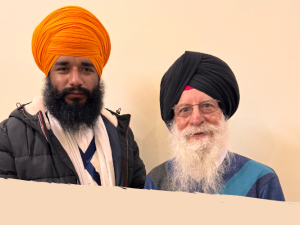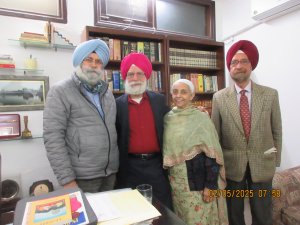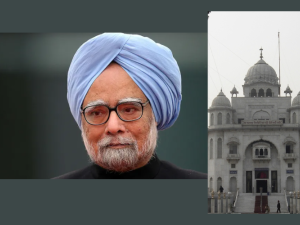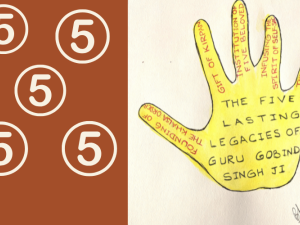Let me start by saying that we have Sri Guru Granth Sahib (SGGS) at home, and I do what we call as “khula Paath”, which means reading from the entire scripture without skipping in an orderly manner at a convenient pace. I have read the entire scripture in “khula Paath” a few times. I am sure, I have read this particular shabad each time, as I went through the reading process. But when recently I heard these lines of Guru Nanak Dev Ji, defining the ten stages of human life, each a decade long from someone, it sounded like a refreshingly new and an unheard idea. Needless to say, listening to those words made me initiate another study of the shabad and this writing is a result of that study. Let me first share the shabad:
ਮਃ ੧ ॥
ਦਸ ਬਾਲਤਣਿ ਬੀਸ ਰਵਣਿ ਤੀਸਾ ਕਾ ਸੁੰਦਰੁ ਕਹਾਵੈ ॥
ਚਾਲੀਸੀ ਪੁਰੁ ਹੋਇ ਪਚਾਸੀ ਪਗੁ ਖਿਸੈ ਸਠੀ ਕੇ ਬੋਢੇਪਾ ਆਵੈ ॥
ਸਤਰਿ ਕਾ ਮਤਿਹੀਣੁ ਅਸੀਹਾਂ ਕਾ ਵਿਉਹਾਰੁ ਨ ਪਾਵੈ ॥
ਨਵੈ ਕਾ ਸਿਹਜਾਸਣੀ ਮੂਲਿ ਨ ਜਾਣੈ ਅਪ ਬਲੁ ॥
ਢੰਢੋਲਿਮੁ ਢੂਢਿਮੁ ਡਿਠੁ ਮੈ ਨਾਨਕ ਜਗੁ ਧੂਏ ਕਾ ਧਵਲਹਰੁ ॥੩॥Dhas baalatan bees ravan teesaa kaa sundhar kahaavai.
Chaaleesee pur hoi pachaasee pag khisai saThee ke boddepaa aavai.
Satar kaa matiheen aseehaan kaa viauhaar na paavai.
Navai kaa sihajaasanee mool na jaanai ap bal ||
Dda(n)ddolim ddooddim ddiTh mai naanak jag dhooe kaa dhavalahar. 3. (SGGS, Pg. No. 138)
Translation:
First ten (years are spent) in childhood, twenty in playfulness, and at thirty is called beautiful (handsome).
At forty, the completeness occurs; at fifty, the foot falters; at sixty, the old age sets in.
At seventy, the intellect takes a hit; at eighty, the ability to take care of self is impaired.
At ninety, becomes bedridden, incapacitated, unable to take care of self without assistance.
Nanak: I searched, I searched, and I found that this world is a mansion of smoke (visible one moment and then gone next moment).
First thing that impressed me is that all stages are of equal duration and in a chronological order. Let us try to understand what Guru Ji is saying about each of these 10 stages of life:
- Childhood – First decade of human life is spent in childhood - exploring everything but being nurtured, taken care of, protected, and provided by the family.
- Adolescence – In this stage by playing with friends and family at home and school the child learns to gain independence, confidence, finds a sense of identity, and prepares to face the world.
- Early Adulthood – In this stage the adolescent has developed into a young adult; full of vigor, sees his/her own beauty (a kind of a little narcissistic). S/he is now physically and mentally ready to explore the world, and also form intimate and loving relationships outside the family.
- Full Bloom- The development of physical strength and mental capabilities are at its peak. The person raises a family, becomes a productive member of society. Apparently, forty is the average mid-point of life and its peak. If the lifespan is like a parabolic curve, then Forties is its peak. A confirmation for it emerges from the data on the average age of research of Nobel laurates which is 44.1. It indicates that they had started their research in their field when they were in this stage of their lives. Although they may have been awarded their Nobel prize at a much later age.
- Foot Faltering – This is the stage which has been commonly termed as ‘over the hill’. At this stage the slow, and irreversible decline towards old age sets in. The stride is missing a beat and the person is slowing down.
- Old age Sets in – It is not surprising that the age of sixties has been designated as retirement age. Although the governments are trying to raise the retirement age for its economic boost. At this stage some degree of assistance becomes necessary to care of the self.
- Cognitive Impairment – At this stage one finds that forgetting details has become second nature, memory impairment is noticeable. Most folks with dementia, Alzheimer, and Parkinson disease are from the age group of seventies. It is also termed as becoming senile.
- Becoming Disabled – At this stage one experiences frailty, inability to take care of oneself without assistance from others. One is not able to take part in certain activities of life, this becomes a new and an altered reality in life. Now the life’s essentials are reading glasses, dentures, hearing aids, walker/walking cane, and medicines etc.
- Bedridden – In this stage health issues, dementia, infirmity from old age and bone fractures pushes the person to the periphery of the society. The person needs help with personal chores and becomes dependent, almost like a newborn.
- Realization that Life is a dream –Guru Ji has termed this stage as ‘mansion of smoke’ implying that the transitory nature of life like smoke, which does not last for long. At this stage one reflects back at the events of their lives, come to the realization on the transitory nature of life. Just as we discover that our memory and reflective ability are substantially limited within dreams, a similar reality is also experienced in life as well.
The Ten stages as defined by Guru Nanak Ji are shared here in the Tabular form here.
Table
The English Terms used here in translation above to describe the life stages have been picked from the commonly used words and prevalent parlance, so these are not literal translation of the terms used by Guru Ji. The scientific world has accepted the 8 Stages defined by Erik Erikson of Germany in 1950. He was a developmental Psychologist, who is best known for his theory of psychosocial development. The first four stages defined by him are covered in the first stage by Guru Ji. His fifth stage can be more or less can be equated to Guru Ji’s stage 2. His sixth stage is covered by Guru Ji’s division in stages 3 and 4. Erikson’s seventh stage can be related to stages 5, and 6 plus 7 partially. Erikson’s last stage 8 envelopes everything over the age of 65, while Guru Ji has covered it in three stages of 8, 9, 10 fully and 7 partially. The society in general lumps these stages together, being labeled as ‘seniors’ or ‘the elderly’. The implications of these terms are not reverential, but a gentle reminder of having become redundant. Lest we forget we all are going to witness it firsthand ourselves, only if we manage to live that long.
Based on the above usage of terms for the 10 stages, today I would personally belong to stage 8: implying Cognitive Impairment. If someone attempted to apply that term to me, I would not be amused. But here is a caveat, that I will not be in a denial mode either. Because I have actually only experienced 25%, and still have to experience the remaining 75% of that stage, so I don’t have any basis to take a stand. In addition, the remaining two stages are like a black box - unknown. So, I cannot take a victory lap too early. There is no denying that my physical strength, mental agility, vigor, and my memory have seen a decline from their prime. In any case, the remaining two, namely 9 and 10 are not appealing options, but they are scarier options. Only very few make it to these stages, despite their loathsome welcome from those making it. Guru Tegh Bahadur Ji has painted that picture in these words:
ਸਿਰੁ ਕੰਪਿਓ ਪਗ ਡਗਮਗੇ ਨੈਨ ਜੋਤਿ ਤੇ ਹੀਨ ॥ ਕਹੁ ਨਾਨਕ ਇਹ ਬਿਧਿ ਭਈ ਤਊ ਨ ਹਰਿ ਰਸਿ ਲੀਨ ॥੪੭॥
“Sii-r kameyo pagh daghmaghe, nai-nn jyot te hee-n. Kaho Nanak eh bidh ba-hee, ta-oo na Har ras lee-n. 47.” (SGGS, Pg. No. 1428)
Translation: Oh Brother! In old age the head shakes, the feet stagger, the eyes lose sight, despite this condition the man does not absorb himself in the taste of God’s Naam.
Guru Ji has rightly pointed out above that I have “na Har ras lee-n”. Really very true that I have not tasted the Divine nectar. But then where do I look for scour now? The only alternative, I see for myself is to run to my Guru Ji seeking help as:
ਬਾਝੁ ਗੁਰੂ ਡੁਬਾ ਸੰਸਾਰੁ ॥੨॥
“Baajh guroo ddubaa sa(n)saar. 2.” (SGGS, Pg. No. 138)
Translation: Without the Guru, the world is drowning. ||2||
The life of Guru Amardas provides us hope and inspiration. Bhai Amardas came to Guru Angad at age around 62, and in 12 years with his dedication, service, and commitment, had won over Guru Ji’s heart. At 73, he was anointed as the successor to Guru Angad and successfully led the community of followers. Guru Amardas lived till the age of 95 and did not have any impairment because of old age. He contributed 907 hymns to Sri Guru Granth Sahib. He set up Masand system of preacher/ representatives and assigned them different territories for preaching and also set up set up a city of Goindval. His own sayings fills me with hope:
ਗੁਰਮੁਖਿ ਬੁਢੇ ਕਦੇ ਨਾਹੀ ਜਿਨ੍ਹ੍ਹਾ ਅੰਤਰਿ ਸੁਰਤਿ ਗਿਆਨੁ ॥ ਸਦਾ ਸਦਾ ਹਰਿ ਗੁਣ ਰਵਹਿ ਅੰਤਰਿ ਸਹਜ ਧਿਆਨੁ ॥
“Gurmukh budde kadhe naahee jin(h)aa a(n)tar surat giaan. Sadhaa sadhaa har gun raveh a(n)tar sahaj dhiaan.” (SGGS, Pg. No. 1418)
Translation: The Gurmukhs never grow old as within them is intuitive understanding and spiritual wisdom. They chant the Praises of the Lord, forever and ever; deep within, they intuitively meditate on the Lord.
His own life is my only inspiration and hope. I have not climbed up on the spirituality ladder, but still I have come to seek your sanctuary. I have nothing else in my repertoire, Guru Ji, so please bless me with the spiritual wisdom and mediation on the Lord. Knowing that you are very compassionate I have set my eyes on you:
ਇਹੁ ਸਰੀਰੁ ਜਜਰੀ ਹੈ ਇਸ ਨੋ ਜਰੁ ਪਹੁਚੈ ਆਏ ॥ ਗੁਰਿ ਰਾਖੇ ਸੇ ਉਬਰੇ ਹੋਰੁ ਮਰਿ ਜੰਮੈ ਆਵੈ ਜਾਏ ॥
“Eih sareer jajaree hai is no jar pahuchai aae. Gur raakhe se ubare hor mar ja(n)mai aavai jaae.” (SGGS, Pg. No. 584)
Translation: This (human) body is frail (breaks upon impact like an earthen pot); death is ready to strike it dead in (the vulnerable) old age. Only those who are protected by the Guru are saved, while others die, to be reincarnated as they continue coming and going.
My only hope is in protection by the Guru and mercy of God. My Guru has also told me about the merciful and benevolent nature of God in these words:
ਨਾਨਕ ਸਾਹਿਬੁ ਸਦਾ ਦਇਆਲੁ ॥੨॥
“Nanak saahib sadhaa dayal. 2.” (SGGS, Pg. No. 268)
Translation: O Nanak, our Lord and Master is merciful forever. ||2||
May Guru Ji’s guidance and mercy of God save me from the cycles of births and deaths so that I don’t have to go through these different stages of life again. Although, the old age is debilitating, it incapacitates us of our physical strength, making us dependent, but we have hope in mental and spiritual fortitude which Guru can bless us with. It is not dependent on the chronological age, nor loses its potency with age. That fortitude enables us to handle even the trying times with poise and without a complaint. Guru Amardas has painted the picture in these words:
ਓਇ ਸਦਾ ਅਨੰਦਿ ਬਿਬੇਕ ਰਹਹਿ ਦੁਖਿ ਸੁਖਿ ਏਕ ਸਮਾਨਿ ॥ ਤਿਨਾ ਨਦਰੀ ਇਕੋ ਆਇਆ ਸਭੁ ਆਤਮ ਰਾਮੁ ਪਛਾਨੁ ॥੪੪॥
“Oi sadhaa ana(n)dh bibek raheh dhukh sukh ek samaan. Tinaa nadharee iko aaiaa sabh aatam raam pachhaan. 44.” (SGGS, Pg. No. 1418)
Translation: They dwell forever in blissful knowledge of the Lord; they look upon pain and pleasure as one and the same. They see the One Lord in all, and realize the Lord, the Supreme Soul of all. ||44||
References:
- SGPC, Sankehp-Jeeewan Sri Guru Amardas Ji tae Goindval Sahib dae Gurudwarae. SGPC
- Khosla Anju. The Life & Teachings of Guru Amardas. Singh Brothers
- www.Sikhitothemax.com
Would you like to get the SikhNet summary delivered to your inbox every Friday? If so subscribe to the news (HERE). If you'd like to contribute an original article, please read our editorial guidelines and email us at: [email protected]







